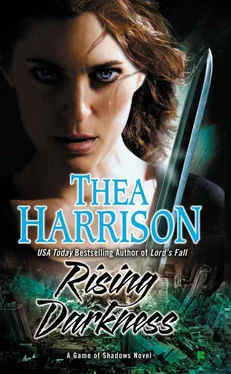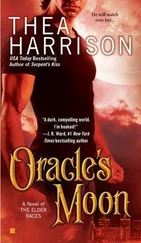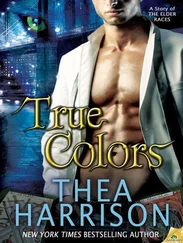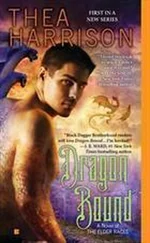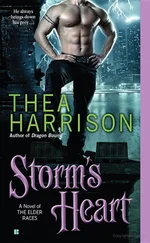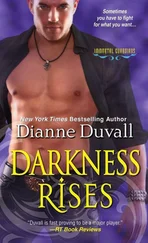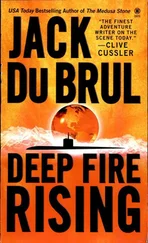She caught sight of a T.G.I. Friday’s, and on impulse she pulled into the parking lot. The restaurant was everything she had hoped to find: cheerful, noisy and banal. She parked, stripped off her jacket and left it in the car. Climbing out and locking the doors, she went inside and stopped at the hostess desk. Overloud music, flickering imagery from high-mounted flat-screens, the red – and white-striped decor and the babble of various conversations crashed over her head.
The wavy Van Gogh effect was everywhere in the restaurant. Reflections of light were sharp on the polished wood and edges of glass. For a moment everything seemed to shift, as if it were breathing. She stood disoriented and somewhat sick, as a young waitress in jeans hurried toward her.
“Hi, how many?” the waitress asked in a bright voice.
The girl was very Van Gogh, radiating near-invisible ripples like steam rising from a pot of boiling water. Trying to make it stop, Mary blinked several times as she looked around. Even though the day had faded into early evening, the tables were crowded. A high proportion of the patrons were families with young children. Everyone was haloed with the same kind of rippling effect.
She shifted from foot to foot. Maybe coming here was a mistake. She would hate to cut off her ear in public.
She became aware of the waitress’s fixed, patient smile and consulted her watch. It was already almost five o’clock. Where the hell had the time gone?
“I’m alone,” she said. “I can eat at the bar.”
“Okay! Here’s a menu. Just go have a seat, and someone will be with you in a minute.”
She took the menu and went to the bar, where the music was somewhat lower. Unfortunately, it still competed with the noise from the flat-screen mounted high in one corner. The local news would be starting soon, so she chose a seat nearest the television, although she still wasn’t sure she would be able to stay. The overload of input made her head throb worse than ever. The light, hollow sensation from earlier had intensified until she felt as if she was only loosely connected to her flesh.
The bartender worked in an area ringed by the bar. He came up to her, a young, blond male with an appreciative, blinding Donny Osmond smile.
“How’re you doing today?” he asked. He wiped the area in front of her.
Mary cleared her throat and tried not to look at his mouth. “It’s so noisy in here.”
His smile turned crooked. “Yeah, I’ve gone deaf since I started working here. I can ask the manager to turn it down, but I can’t promise anything. It’s out of my control.”
“Thanks.”
“Can I get you something to drink?”
“Coke, please.” She opened the menu and the items blurred in front of her. “I’m starving, so anything sounds good. What’s quick?”
“The burgers come up pretty fast.”
She ordered a burger with everything, fries and a salad, and sucked down the Coke he placed in front of her. He brought her the salad and refilled her drink as she tore into the food. “You weren’t kidding about being hungry.”
The high fructose corn syrup from the Coke and the first few bites of food helped to anchor her back in her body. Conscious of the bartender’s speculative expression, she swallowed and told him a version of the truth. “I’ve been too busy to eat right these last few weeks, and all of a sudden it caught up with me.”
“Oh yeah? I do that when I’m studying for finals. I live on caffeine and cigarettes. Afterward I sleep for three days.”
“Where do you go to school, Notre Dame?” she asked.
He laughed. “Naw, can’t afford that. I’m going to IUSB. I’m majoring in business administration.”
The South Bend area was filled with higher education schools. Notre Dame University was the most famous of the schools, but there were also Indiana University at South Bend, St. Mary’s College, Holy Cross, Bethel, Ivy Tech and others. The wide choice, together with a relatively low cost of housing, made the area a good place to pursue a higher education.
When her aunt had died, the inheritance Mary had received had been relatively modest. She had been able to afford the prestige of a Notre Dame degree but little else, so she’d had to share an apartment with three other young women to cover housing costs.
The bartender leaned against his side of the bar and talked about school while she polished off her salad. She kept one shoulder hunched against the intrusion of his admiring presence, as her gaze returned again and again to his moving mouth. Those strong, bleached teeth would make quite a bite impression.
She had treated a bite victim last week. It had been a human bite, not animal. Each tooth mark had made a distinct puncture. Dots of blood had welled from the tiny wounds. After dressing it, she had given the victim a tetanus shot and a round of antibiotics. Nasty things, human bites.
Her burger and fries seemed to take forever to arrive. At last the bartender took away her empty salad plate, brought her the burger platter and moved down the bar to serve someone else. She tore into her burger with the same single-mindedness she had shown for the salad, chewing while she sprinkled catsup on her French fries.
Then she caught sight of the bite she had taken out of the burger. The beef patty oozed pinkish juice. She looked at the bright red sprinkled across the fries, and the food in her mouth transformed into a rock as her ravenous hunger fled as abruptly as it had appeared. She fought to swallow, gagged and gulped more Coke to shift the clump down her throat.
The early evening news caught her attention and she looked up. The bar area was noisier than she thought it would be, and the TV’s volume was turned low. The channel was set on a news show that was more sensational than she preferred, so she didn’t think she was missing much.
She glanced up a couple of times as she struggled to eat a few more bites. She was unable to hear the news anchor’s voice-over, so she had no warning. From one glance to the next, the scene changed. When she looked up, she found herself staring at a broadcast being filmed live from her neighborhood in St. Joe.
They were filming her house.
It was on fire. Flames poured out of the windows.
The HDTV swam in her vision. She coughed food.
“Hey,” said the bartender. He moved back toward her. “Are you all right?”
She waved her hand toward the television and wheezed, “Turn it up. That’s my house.”
“What?” He glanced up. “You’re shitting me. Hold on.”
He searched for the remote while Mary stared at the scene of trucks, firefighters and flames that shot out of every window of her ivory tower. The bartender found the remote and punched the volume up in time to catch the end of the news segment.
“. . . A neighbor called it in just after three o’clock this afternoon. No one knows yet if the owner was inside. Officials say that they should have the fire out before dark. It might be well into tomorrow before what’s left of the home is cool enough to inspect. There’ll be more live coverage tonight. . . .”
Mary’s pulse pounded so hard she could hear it in her ears. She put a hand to her mouth, to her forehead. The bartender, his young handsome face concerned, leaned toward her. His lips moved around those sharp white teeth. He seemed to be asking if she was all right.
“No, I’m not all right,” she said. She gave him an incredulous look and flung out one hand in the direction of the television. “That’s my house .”
“There wasn’t anybody at home, was there?” he asked.
“What?” She looked from him to her plate full of greasy food. Back to him again. Already in knots, her stomach lurched. The film clip had shown the blaze roaring out of every window and door. Even if the firefighters were able to put the fire out right after the broadcast, her work, the quilts, the paintings, her clothes, the few mementoes she had from her childhood, everything would be gone. “No. No, nobody was home, I live there alone. No pets. Just me in my house. And all of my things. Everything. Everything I own.”
Читать дальше
